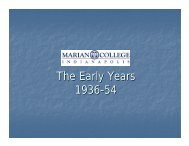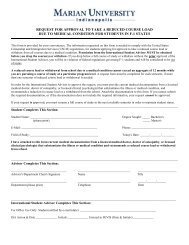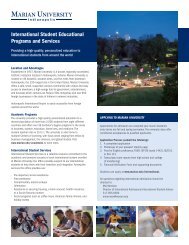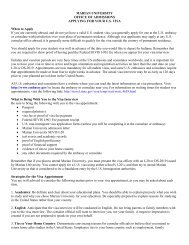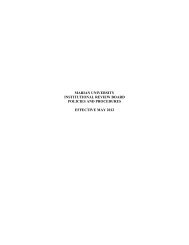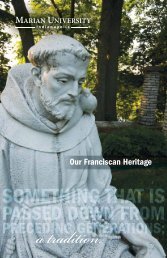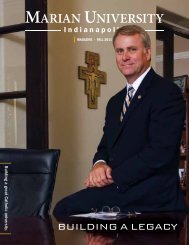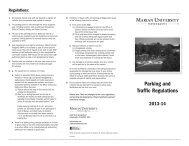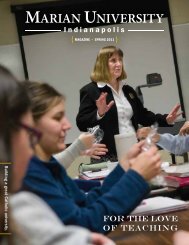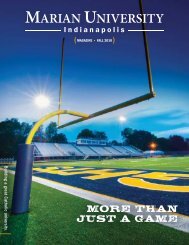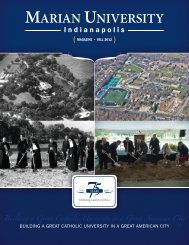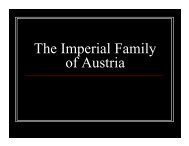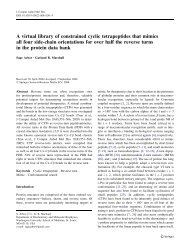2009-11 Marian University Course Catalog, fall 2010 edition
2009-11 Marian University Course Catalog, fall 2010 edition
2009-11 Marian University Course Catalog, fall 2010 edition
Create successful ePaper yourself
Turn your PDF publications into a flip-book with our unique Google optimized e-Paper software.
PHL 130<br />
Human Nature and Person 3 credits<br />
This course addresses what it is to be human and what it<br />
means to be a human person. Particular emphasis is given to<br />
exploring these themes within the Western and specifically<br />
Catholic philosophical tradition in dialogue with other, and<br />
sometimes competing, positions. This course partially<br />
satisfies the general education requirement in the<br />
philosophical and theological reasoning category. (SEM)<br />
PHL H30<br />
Honors Human Nature and Person 3 credits<br />
Prerequisite: Student must meet Honors Program criteria.<br />
Content of PHL 130 is enriched with more reading and<br />
writing. Limited enrollment. This course partially satisfies the<br />
general education requirement in the philosophical and<br />
theological reasoning category. (FAL)<br />
PHL 150<br />
Logic 3 credits<br />
This reasoning skills-development course examines basic<br />
logical concepts and shows their applicability to all areas of<br />
reasoning. Required of philosophy majors, but strongly<br />
recommended to everyone, especially those contemplating<br />
law school or graduate school. (FAL)<br />
PHL 203<br />
Plato and Aristotle 3 credits<br />
This course investigates philosophical works of the two<br />
acknowledged giants of Greek thought, Plato (ca 428-348<br />
B.C.) and Aristotle (384-322 B.C.), in historical context and<br />
especially for subsequent impact on Western thought. Inclass<br />
reading and discussion. (2FE)<br />
PHL 205<br />
Augustine and Aquinas 3 credits<br />
This course investigates the philosophical works of two<br />
acknowledged giants of Christian thought, Augustine of Hippo<br />
(A.D. 354-430) and Thomas Aquinas (1225-1274), in historical<br />
context and for subsequent impact. In-class reading and<br />
discussion. (2FO)<br />
PHL 215<br />
Personal and Professional Ethics 3 credits<br />
This course introduces the student to ethics through<br />
philosophical reflection on the development of the student’s<br />
moral judgment with particular attention to ethical issues<br />
related to being a professional in contemporary society.<br />
Topics include personal development in making moral<br />
judgments, critical assessment of different ethical theories,<br />
the meaning of being a professional, the social obligations of<br />
professionals, and the relationship between personal and<br />
professional morality. (SPR)<br />
PHL 230<br />
Philosophy of Beauty and Art 3 credits<br />
An examination of the beautiful as such and the beautiful in<br />
art, from the stance of classical philosophy. Although this is<br />
fundamentally a philosophy course, just as important are field<br />
trips to experience the various forms of the beautiful. (ADD)<br />
PHL 240<br />
Social and Political Philosophy 3 credits<br />
Prerequisite: PHL 130 or permission. A search for the<br />
principles of the just state, including various notions of<br />
human nature, common good, the nature of institution and<br />
law, justice and right, sovereignty, force, and various social<br />
units such as family and labor unions. (2SO)<br />
PHL 260<br />
Asian Philosophies 3 credits<br />
Prerequisite: 130. This course is a very broad survey of major<br />
philosophical themes in five Asian traditions—Hinduism,<br />
Buddhism, Confucianism, Taoism, and Islam. The format is inclass<br />
reading and discussion of classical texts. This course<br />
partially satisfies the general education requirement in the<br />
cultural awareness category. (SEM)<br />
PHL 310<br />
Kafka, Kierkegaard,<br />
Dostoyevsky, and Camus 3 credits<br />
Readings and discussion of Kafka’s Metamorphosis,<br />
Kierkegaard’s The Sickness Unto Death and Fear and<br />
Trembling, Dostoyevsky’s The Grand Inquisitor, and Camus’<br />
Myth of Sisyphus. An introduction to the notions of self,<br />
freedom, despair, and authenticity in the view of both<br />
atheistic and Christian existentialism. (2SO)<br />
PHL 320<br />
Philosophy of Knowledge 3 credits<br />
A critical study of various positions on the nature and limits of<br />
human knowledge, including their metaphysical and<br />
anthropological implications. Readings are drawn from<br />
classical and contemporary sources, with special emphasis<br />
being placed on the critical realism of Bernard Lonergan.<br />
(2FE)<br />
PHL 330<br />
Philosophy of Being (Metaphysics) 3 credits<br />
Inquiry into the ultimate explanations and structure of real<br />
things; an account of our search for such knowledge and the<br />
solutions of thinkers characteristic of the ancient, medieval,<br />
and modern periods. (2SE)<br />
<strong>11</strong>8



